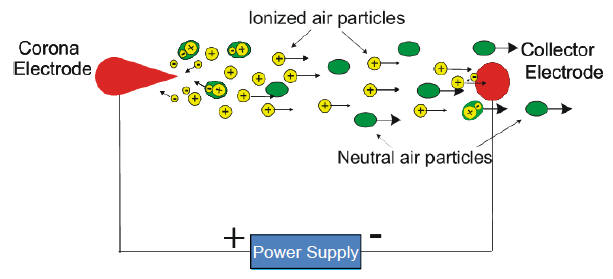Cool Your PC or Laptop with Ionic Wind
Tessera is developing a cooling system that charges ions to move air particles away from a laptop's heat source.
Back in March, international chip-packaging company Tessera presented a unique idea to attendees of the IEEE Semi-Therm Symposium. The presentation illustrated a way to cool a working laptop by eliminating the commonly used fan. In its place, Tessera proposed a cooling system that charges ions to move air particles away from the heat source. According to the company, this unique iconic-cooling system can actually extract 30-percent more heat from a device than the conventional exhaust fan.
"Today, consumers are demanding electronic products--such as notebook computers, game consoles, and set-top boxes--that are high performance, ultra compact and extremely reliable," the company said. "However as these products become increasingly more computing-centric, they are generating substantially more heat in smaller areas and putting a strain on conventional cooling solutions: mechanical fan-based systems that are large, noisy, and unreliable."
As defined in the company's presentation, a high intensity electric field ionizes air molecules surrounding the cooling system's electrode tip. While the ions travel from the corona electrode to a collector electrode, they collide with neutral air particles, transferring charge and momentum, and increasing airflow. As an example, Tessera's ionic cooling system could be mounted next to a laptop vent. Heat pipes leading from the stressed CPU would carry the heat to a point between the ionic cooling system electrodes. Thus, the charged molecules, moving from the corona to the collector, would carry the heat away from the heatpipe, and out the vent.
The development process hasn't been easy for the company, however. Because laptops are built to function for at least 30,000 hours, the research team needed to find a way to keep the electrode materials from corroding prematurely. Another challenge presented itself in the form of power consumption, requiring the development of a converter that transforms the laptop battery's 12 volts DC into the required 3,000 volts necessary to power the ionic cooler. The research team eventually developed a tiny power supply roughly three centimeters square in size.
Tessera is currently trying to determine how to reduce the amount of dust invading the space surrounding the electrodes, possibly by using a prefilter to lessen the amount of damaging particles. "Dust collection reduces efficiency," the company said, adding that multiple solutions are still under development. According to Tessera, stock laptops will not need to be altered other than removing the pre-installed fans. The cooling system is fully self-contained, featuring the ionic blower and power supply built right into the fan cavity.
Ultimately, the advantage to having this system installed is that it remains quiet, features no moving parts, costs less than the conventional fan, has a flexible form factor, and consumes less power. Unfortunately, the technology is still under development. However, Craig Mitchell, senior vice president of the Interconnect, Components, and Materials division of Tessera, said that the company plans to commercialize the system next year.
Get Tom's Hardware's best news and in-depth reviews, straight to your inbox.

Kevin Parrish has over a decade of experience as a writer, editor, and product tester. His work focused on computer hardware, networking equipment, smartphones, tablets, gaming consoles, and other internet-connected devices. His work has appeared in Tom's Hardware, Tom's Guide, Maximum PC, Digital Trends, Android Authority, How-To Geek, Lifewire, and others.
-
PC_GI Great, now when i go to work on peoples laptops i will be met with a 6000v 'welcome sign' that shocks the piss out of me.Reply -
anamaniac How about quiet desktop solutions?Reply
liquid cooling is great and all, but if you're building a cheap HTPC, it may be out of budget.
This is saying cheap, quiet, efficient. I like the idea of it. Makes sense if you want something quiet that performs well. -
starryman It would be cheaper and better just to make the heat sink bigger simply by spreading it out throughout the chasis via heat pipes.Reply -
PC_GI anamaniacHow about quiet desktop solutions?liquid cooling is great and all, but if you're building a cheap HTPC, it may be out of budget.This is saying cheap, quiet, efficient. I like the idea of it. Makes sense if you want something quiet that performs well.Reply
Performs well, Unless you get dust.. Im in Iraq right now... This would never work here and I know common folk refuse to dust their PC's... it will spell disaster!! -
simplyderp PC_GIGreat, now when i go to work on peoples laptops i will be met with a 6000v 'welcome sign' that shocks the piss out of me.Reply
How about 1 amp? /gg -
coopchennick What about it producing ozone? Even Sharper Image admits that their ionic breeze air purifier produces ozone.Reply
I wouldn't want to have to google myself out of a locked closet with one of these in my laptops...
